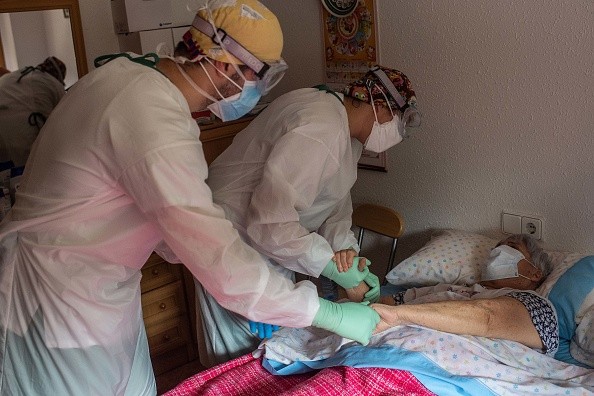Latin American Hospitals Allowing Visitors of Dying COVID-19 Patients Increases
Several Latin American hospitals have been allowing visitors of dying COVID-19 patients.
In Buenos Aires, the Mater Dei sanatorium is one of the growing numbers of medical facilities in Latin America that allows relatives to be with patients dying of coronavirus.
Visitors were strongly advised to wear a face covering, shield, and protective clothing to avoid contracting the virus.
Augusto Briceño is one of the relatives of a COVID-19 patient that experienced visiting his mother. Briceño hugged his mother lying in a bed inside a COVID-19 intensive-care ward.
Briceño said he sensed his mother's warm body through his protective gloves and felt full of peace.

Visits to COVID-19 patients are now becoming normal in the United States and Europe.
According to LA Times, Britain had to ease its rules on visiting coronavirus patients in April after politicians and public people were horrified to hear that a 13-year-old boy died alone in a London hospital due to COVID-19.
Latin America is being hit hard by the novel coronavirus. However, allowing family members to visit patients remains rare in the region.
Some hospitals in Brazil and Chile had allowed visitors to die COVID-19 patients. According to physicians consulted by The Associated Press, there are at least eleven hospitals in Argentina that enable visitors for severe to dying COVID-19 patients.
In another facility in Buenos Aires, Fernanda Mariotti's mother was confined with COVID-19. The doctors refused Mariotti to see her mother because the hospital rules for COVID-19 patients do not allow visitors.
Mariotti, 53, is a pediatrician that was convinced that her mother's death was partly because of the "pain and fear" of being separated from her family. The pediatrician said that disabled or aging patients need visits from their loved ones.
According to ABC News, Argentina had almost 370,000 confirmed COVID-19 cases and more than 7,000 deaths due to the disease.
The Mater Dei head of pediatric intensive care, Cristian García Roig, said he believes that if the medical staff can safely treat COVID-19 patients, those patients' families and relatives could secure their visit to the patient the same precautions.
Mater Dei began allowing relatives to have a 15-minute visit accompanied by medical personnel in April.
Those who are less seriously ill minors or patients with psychological or developmental problems are also allowed to have a relative to accompany him full-time. But that relative must have a complete two-week quarantine after leaving the facility.
In the Argentine city of La Plata, the Dr. Rodolfo Rossi General Hospital allows dying COVID-19 patients to be visited by a relative as long as the visitor is not in a high-risk category.
Visitors must also wear complete protective equipment, as per the hospital's head of palliative care, María de Los Ángeles Mori.
Mori said that the ability to be with a dying loved one is more than worth the risk for many relatives of COVID-19 patients.
"Dying alone is not the same as being accompanied," Mori said. "Saying goodbye and not saying goodbye is very different," the hospital's head added.
Check these out:
Nevada Man Becomes First Case of COVID-19 Reinfection in US
Why Women May Experience Less Severe COVID-19 Disease than Men
COVID-19 Tremendously Affects Latino Communities; Funeral Homes Also Struggle
Subscribe to Latin Post!
Sign up for our free newsletter for the Latest coverage!
© 2025 Latin Post. All rights reserved. Do not reproduce without permission.













